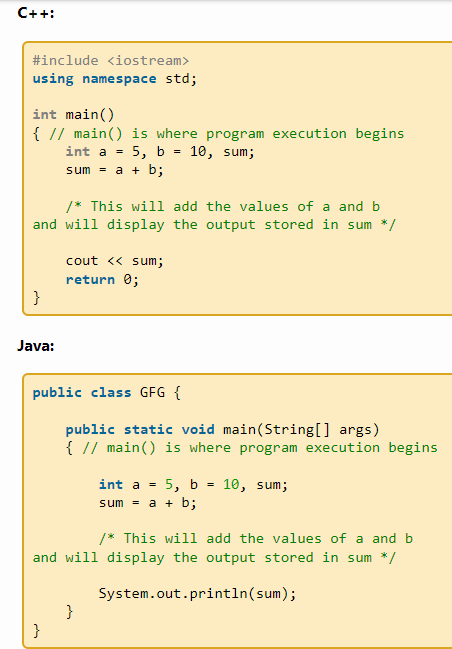In a programming language, java refers to general-purpose subject-oriented software design with fewer implementation dependencies. On the other hand, C++ is more advanced programming that evolved from the C programming language to improve the designs available and allow for a high degree of memory in computer resources (Long et al., 2014). The main differences between java and C++ comes in dependency, system control, and memory management. The two programs are similar because they are object-centric commands supporting polymorphism and encapsulation in software development and usage.
Detailed Comparison in Performance Implementations that Would have Threading
The performance implementation for java is efficient as it comes from just-in-time (JIT) compilers. That means concurrency is supported as the JIT compiler is part of the runtime for the program environment. While implementing, there is a compilation of byte-codes into the normal machine code that runs virtually by direct coding (Long et al., 2014). Unlike java, C++ is more advanced since it improves the performance by generic commanding and metaprogramming through overloading and exception of handling units that are hard to execute in java. Java tends to facilitate programming by dynamic memory by utilizing ‘malloc()’ and ‘calloc()’ functions which serve as free functions (Eck, 2015). In C++, the language allows allocation of memory by use of another operator within a given handset software. The two applications process data by interacting with conventional methods to produce results. For instance, the loading of datasets is streamed from system and turned into tokens of characters separated by white spaces memorizing data and showing the result. However, C++ is faster than java since it keeps files in binary format hence consistency in delivering text in time.
While comparing the two programing languages, it is essential to mention the syntax application. The reason is that they have similar syntax. For instance, single and multiple-line protocols or entries have similarities in how the user types them, such as //… or /*…*/ in that order, as shown in Figure 1 below (Ballman, 2016). The object-oriented support allows the performance of common properties from different classes for the two programming languages.

Regarding security threats, implementing java is less vulnerable when compared to C++. The reason is that Java programs are run virtually by sandboxes; hence, they may not allow explicit pointers. Unlike java, C++ uses pointers that may lead to memory blocks if other commands access the highlighted values. It is more secure to implement the java model because it requires a byte-code verification to check the fragments that may be illegal. C++ does not initiate byte-codes, which means a virus could be executed easily after compilation, making it risky for stored data (Long et al., 2014). Additionally, java involves exceptional handling that bars the generation of errors during runtime, unlike C++, which does not have significant control of the application programming interface (API). Thus, due to the above factors, it is less vulnerable to implementing java than C++.
Before C++ was designed, the previous versions did not acknowledge concurrency. That means any threading commands developed were implemented using a specific extension. C++ has a multithreading model that memorizes basic facilities such as condition variables (Ballman, 2016). When it comes to java, there are containers aimed for concurrent access, but they must be written by a user or obtained from third parties. The advantage of C++ is that it has lambdas, unlike java, that has inner classes implementable through interface derivation. The vulnerability exhibited by strings puts the two applications in high-severity data threat issues. For example, memory corruption may be rampant due to the format-string overflows and buffer errors that occur simultaneously as the user tries to find a configuration during the compilation of various systems (Ballman, 2016). Other examples of vulnerability, in this case, include abnormal command termination, data breach, and disclosure of confidential information.
The security of data exhibited varies in both languages, but java is less affected than C++. In C++, a connection string injection may lead to data threat if no static programming solution exists. For java, there may be sensitive data leaks orchestrated by mass assignment, trust boundary breaches, and arbitrary file coding (Long et al., 2014). Java can use string analysis to prevent the vulnerabilities experienced. The existence of a java string analyser (JSA) has enabled the computation of resulting automata for various string expressions in the java language.
It is essential for a user to implement C++ programming over java. The reason is that C++ has an advantage in functionality regarding threading. Weaknesses experienced in C++ are corrected by configuring structured query language (SQL) enablers preventing process control errors that may affect contemporary programming. A remedy, in this case, is the integration of CxSAST to test solutions that enable C++ code compliance with security issues dissimilar to java that is limited on that note (Ballman, 2016). Unlike java, C++ offers resources to the user to understand how a computer system’s threat or vulnerability may be costly. Java only identifies the ways to fix the possibility of continuous development of risk by preventing further formation of issues in a given location (Long et al., 2014). Therefore, when implementing a sophisticated system, C++ is better than java since it offers support to eliminate the escalation of an experienced challenge within the programming field.
References
Ballman, A. (2016). SEI CERT C++ Coding standard: Rules for developing safe, reliable, and secure systems in C++. Hanscom, MA.
Eck, D. (2015). Introduction to programming using java, seventh edition (7th ed.). Pearson.
Long, F., Mohindra, D., Seacord, R., Sutherland, D., & Svoboda, D. (2014). Java coding guidelines: 75 recommendations for reliable and secure programs. Addison-Wesley.